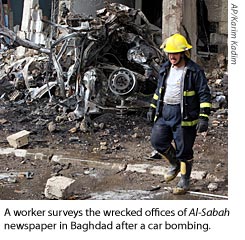New York, August 28, 2006—The Committee to Protect Journalists condemns Sunday’s deadly car bomb attack on the state-run daily newspaper Al-Sabah. The blast killed two people, injured 20 others, and caused severe damage to the newspaper building in Baghdad’s northern Waziriya district. The newspaper published on Monday despite the attack.
The explosive-packed car detonated in the building’s garage at about 8:30 a.m., killing a guard employed by the newspaper and another, unidentified person, Al-Sabah sources told CPJ. The guard’s name had not been released as of today. Twenty other employees, including fact-checkers, technicians, and graphic artists, were injured by flying debris, sources said.
CPJ sources said at least 25 cars belonging to the paper were destroyed; Reuters reported that two cars were blown though one wall of the paper. The newspaper’s production department and the offices of Shabaqeh magazine, an Al-Sabah publication housed in the same building, were extensively damaged, according to CPJ sources.
This is the second car bomb attack on Al-Sabah this year. On May 7, Isma’il Muhammad Khalaf, 54, a printing technician for the daily, was killed when a car packed with explosives heavily damaged the rear of the paper’s main offices. At least 25 employees suffered injuries from flying glass and debris.
Insurgents have frequently targeted Al-Sabah and other state-run media because of their ties to the U.S.-supported Iraqi government. Insurgents have killed at least 16 state media employees since 2004, and the offices of Al-Sabah and other state-run media outlets have repeatedly come under attack.
In all, 77 journalists and 28 media support workers have been killed in Iraq since the war began on March 20, 2003, making it the deadliest conflict in CPJ’s 25-year history. The vast majority of victims have been Iraqis.
“We deplore this unjustifiable assault, which is a reminder of the constant threat facing Iraqi journalists,” CPJ Executive Director Joel Simon said. “We call on all parties to cease these senseless attacks.”
